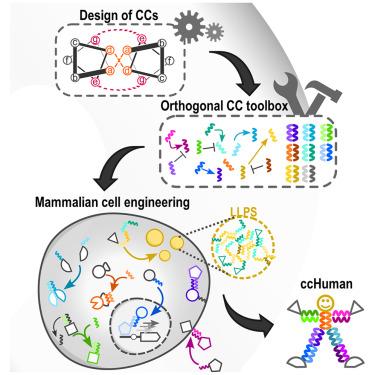Cell Chemical Biology ( IF 6.6 ) Pub Date : 2024-07-05 , DOI: 10.1016/j.chembiol.2024.06.001 Tjaša Plaper 1 , Erik Rihtar 1 , Taja Železnik Ramuta 1 , Vida Forstnerič 1 , Vid Jazbec 1 , Filip Ivanovski 1 , Mojca Benčina 2 , Roman Jerala 2

|
Synthetic biology aims to engineer complex biological systems using modular elements, with coiled-coil (CC) dimer-forming modules are emerging as highly useful building blocks in the regulation of protein assemblies and biological processes. Those small modules facilitate highly specific and orthogonal protein-protein interactions, offering versatility for the regulation of diverse biological functions. Additionally, their design rules enable precise control and tunability over these interactions, which are crucial for specific applications. Recent advancements showcase their potential for use in innovative therapeutic interventions and biomedical applications. In this review, we discuss the potential of CCs, exploring their diverse applications in mammalian cells, such as synthetic biological circuit design, transcriptional and allosteric regulation, cellular assemblies, chimeric antigen receptor (CAR) T cell regulation, and genome editing and their role in advancing the understanding and regulation of cellular processes.
中文翻译:

用于调节哺乳动物细胞的卷曲线圈设计艺术
合成生物学旨在使用模块化元件设计复杂的生物系统,卷曲螺旋(CC)二聚体形成模块正在成为调节蛋白质组装和生物过程中非常有用的构建模块。这些小模块促进高度特异性和正交的蛋白质-蛋白质相互作用,为多种生物功能的调节提供多功能性。此外,它们的设计规则可以实现对这些交互的精确控制和可调性,这对于特定应用至关重要。最近的进展展示了它们在创新治疗干预和生物医学应用中的潜力。在这篇综述中,我们讨论了 CC 的潜力,探索了它们在哺乳动物细胞中的多种应用,例如合成生物电路设计、转录和变构调节、细胞组装、嵌合抗原受体 (CAR) T 细胞调节和基因组编辑及其作用促进对细胞过程的理解和调节。































 京公网安备 11010802027423号
京公网安备 11010802027423号